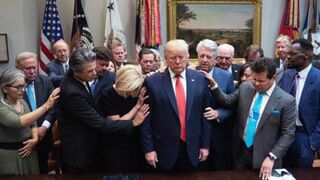President Donald Trump
Can Trump's Followers Be Called a "Cult"?
The case for cult status of Mr. Trump and his followers.
Posted November 13, 2020 Reviewed by Devon Frye
American politics has always had its "rock stars." Our very first president, George Washington, was so popular that his eight-day trip from Mount Vernon to New York in April of 1789 was celebrated by nearly every city with a celebratory dinner along the way. Theodore Roosevelt was such a popular figure that he would attract capacity crowds everywhere he went, and he became a hero to progressives and conservatives alike.
John F. Kennedy, with his youth, vitality, and good looks, combined with the beauty, elegance, and grace of Jackie Kennedy, brought "Camelot" and a romanticization to the White House. Ronald Reagan, an actual movie star, became a venerated figure to millions of Americans, and the gold standard for modern conservatism.
More recently, Barack Obama symbolized hope and change for millions of Americans, while demonstrating that intelligence and a sense of humor were not impediments to great leadership. Each of these presidents had what is often called the “cult of personality.” Yet it could be argued that none of them have quite the following that Donald Trump has. Would it be fair to label Trump's followers a "cult"?

When Donald Trump—trust fund kid turned real estate developer, turned casino owner, turned USFL team owner, turned reality TV star, turned professional wrestler, turned politician—first announced his candidacy for president, he targeted a specific group of voters. Many of his early supporters were disillusioned, dejected, disenfranchised Americans seeking something different from their political leaders. They had grown tired of the partisan bickering and gridlock that they saw in Washington, D.C. They were tired of seeing government handouts for Wall Street, while Main Street was struggling to get by.
Many were looking for someone to shake things up inside the Beltway. Many were involved in the Tea Party movement over the past fifteen years, and many were angry that President Obama had served two terms in the Oval Office. Many were looking for an in-group that would provide them with a sense of something bigger than themselves that they could believe in.
Enter Donald J. Trump, who promised to not only shake things up in Washington but to "drain the swamp." He also promised to "Make America Great Again,” especially for a specific in-group of Americans. In Mr. Trump's plan, this included massive tax cuts for the rich, massive deregulation of businesses across the nation, and limitations on immigration from Muslim nations, Latin America, and what he called "sh*thole countries." He characterized immigrants and those seeking asylum from Mexico and other Latin American countries as "drug dealers, murderers, and rapists." He supported increased immigration from white, Northern European countries; he also claimed that neo-Nazis marching in a white power demonstration in Charlottesville, Virginia were "fine people."
Many of Donald Trump's supporters were looking for someone to shake things up and provide them with an in-group to join. While some don't believe that Mr. Trump and his followers comprise a cult, in my view, the group fulfills the criteria typically used in sociological, religious, and psychological circles to identify a cult.
Definitions vary, but a basic one that applies across disciplines is, "A religion or sect, generally considered to be extremist or false, under the guidance of an authoritarian, charismatic leader for whom members exhibit fixed, even religious, veneration." Mr. Trump's most devoted followers are a relatively small part of the U.S. electorate. They tend to believe in a very specific idea of patriotism that includes international isolationism and xenophobia, under the guidance of a man who some claim was "chosen by God" to lead them.
To further understand how Mr. Trump and his followers may match the definition of a cult, it is helpful to look at how their behaviors compare to the most common behaviors of cults. Cults are typically characterized by:
- One charismatic leader is the group's sole authority on truth; only this leader decides, or has the right to approve, all policies and practices.
Ex: Many of Trump’s supporters reportedly believe that the Presidential election was fraudulent, based on Mr. Trump's claims that it was.
- Members are zealous, protective, and unquestioningly committed to the leader.
Ex: A group of militant fans of Mr. Trump tried to run a Biden/Harris campaign bus off the road in Texas, endangering multiple drivers on the highway.
- Members regard the leader's beliefs and practices as truth and law; the leader affirms and enforces this idea.
Ex: Many of Trump's supporters reportedly believed his false claims about immigrants being more likely to commit serious crimes.
- The group uses public humiliation or punishment to suppress individualism and doubt.
Ex: During the Impeachment trial of Mr. Trump, his supporters in the general public and Congress relied on insulting the Democrats presenting the case and their witnesses, instead of arguing facts.
- Criticism or jokes about the leader or group are taken very seriously and likely punished.
Ex: The refusal to participate in the White House Correspondents Dinner for four straight years may be an example of this approach.
- The group is elitist, claiming special status for itself, its leaders, and its members.
Ex: Some of Trump’s followers report believing that they are “more patriotic” than others.
- The leader and members maintain theirs is the only path to truth and salvation.
Ex: Mr. Trump has repeated the position that only he can fix America’s problems.
Donald Trump has effectively used the pull of his personality to convince many of his followers that they are part of something bigger than themselves. He has convinced them that they are part of an in-group of “real Americans” that can achieve a level of greatness they dream of, and that only he can lead them to that mythical state. We are seeing the consequences of this play out now in our national elections, a topic I will get further into in the second part of this series.
References




